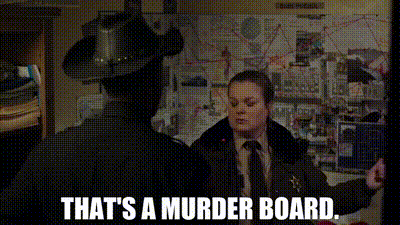Okay, I’ve been dancing around this one for a while, but let’s do it.
Let’s talk about structure.
I think the first thing we need to address is that there are many, MANY types of story structure. If you think of a house, we can talk about its internal structure, but that could mean we’re referring to plumbing, heating, electrical, the actual 2×4 framework, the insulation, or even just the way walls and doors are laid out in the floorplan. All of these are the structure of the house, yes. But we understand that swapping out a circuit breaker isn’t going to fix some clogged pipes, and it’s definitely not going to make a shorter path between the bedroom and the living room. Different structures do different things in different ways, and the ways to implement or fix one don’t necessarily work for the others.
When we talk about structure in writing, it’s the same thing. There’s dramatic structure, narrative structure, three act structure, and more. And some of these have multiple names depending on what school of literature your professors were fans of. And like with a house, we need to account for them all, but they’re definitely all their own thing. And like with a house, we can’t apply the fixes for one to another. What works for this probably isn’t going to apply to that.
And this is why I end up having a problem with a lot of guru types announcing you have to this with structure or you never have to bother with that for structure or sometimes just saying… well, nonsense. It’ s really clear a lot of them have no idea what they’re talking about. I saw someone once arguing that three act structure is outdated and there’s no reason you can’t have five or seven or twelve acts. Which sounds really cool and whoo-hoo we’re breaking rules, especially if you’ve got no idea what three act structure is…
Point is, there’s a lot of folks out there talking about structure who have no idea what they’re talking about and you should probably ignore them and what they say.
With that said… let me talk with you about structure.
I’ve mentioned a lot of this stuff here before, and I’ve done this three part lesson or lecture or whatever you’d like to call it before, too (about six years ago). So if you’ve been reading the ranty writing blog for a while, you’ve probably seen some of it or been referred back to it. I figure it’s never a bad thing to revisit stuff, maybe update some examples, explain things in new ways.
Over the next few weeks, the three forms of structure I want to blather on about are linear structure, narrative structure, and dramatic structure. All of these interact and work with each other, and it’s my personal belief that all three of them have to be strong if I want to tell a strong story. If you want a quick, thumbnail explanation of them–
Linear structure is how my characters experience the story.
Narrative structure is how I, the author, decide to tell the story
Dramatic structure is how the reader gets the story
There’s a little more to it that that, but I’ve found this is a good, quick way to think of them.
So this week we’re going to talk about linear structure. Again, simple version, this is how my characters experience the story. Remember how I mentioned different names for things? Well, the Russian literary term for this is fabula. Another term you may have heard for this is continuity. It’s the line of events from past to present. Thursday leads to Friday which leads to Saturday and then Sunday. Breakfast, coffee break, lunch, dinner. Birth, childhood, college years, adulthood, middle age, old age, death.
If you like, remember I’ve mentioned Watsonian and Doylistic a few times? Things happening within the story as opposed to things I’m doing to the story? Linear structure is a Watsonian thing. I’m still choosing the characters and events, sure, but the linear structure happens entirely within the story.
Now, I mentioned all of these forms of structure are really important, and I’m tempted to say linear structure’s the most important (although I don’t want to pick favorites). And there’s a simple reason for this–most of us are experts when it comes to linear structure. Linear order is how we experience things all the time, every day. We’ve been studying this form of structure our entire lives.
This is why it gnaws at us when somebody knows something now, but doesn’t know it later. We pick up on it when ages don’t quite line up. We tend to notice when effect comes before cause, even if it’s subtle. Even if the story gives these elements to us out of order, our minds tend to sort things back into linear order. Because it’s how we’ve been taught to deal with the world. Things that don’t match this universal structure rub us the wrong way, even if we don’t always realize why.
Another way to think of linear structure is a timeline. And it also lets me point out a key aspect of this. If you’ve ever watched a procedural show or a detective show, it’s really common for the characters to take the various clues and incidents and break them down into on a chalkboard or whiteboard. Maybe they stick up some photos, too. And they all go in the order they happened– 4:08, 4:15, 4:16, 4:23, and so on.

Now, that key thing to keep in mind? It doesn’t matter what order the detectives discover the clues in. If we first learned the maid was here at 4:16 and then later on we learn the butler heard the gunshot at 4:08… well, it may sound silly to say but the gunshot still happened first. Learning about them out of order doesn’t change the order the events actually happened in.
So if I’m writing a story—even if I’m telling the story in a non-linear fashion—there still needs to be a linear structure. And the linear structure needs to make sense. Because readers will notice if it doesn’t.
A good way to test the linear structure of my story is to just arrange all the flashbacks, flash-forwards, recollections, frames, and other devices in chronological order. Pull apart my outline or notecards or whatever I’m using and just… put the story beats in order. Simple, right? The story should still make logical sense like this, even if it’s lost some dramatic punch at a few points (more on that later).
If my story elements don’t work like this—if effect comes before cause, if motivations get really weird, if people know things before they learn them—it probably means I’ve messed up my linear structure. I got so focused on doing clever, out-of-order things that nothing works in order. And—not to keep hammering this point—but people will notice this. They have to. It’s how our brains are wired, to put things in linear order.
There was a show I watched a few months ago that had a non-linear gimmick. Lots of flashbacks in every episode. And not all to the same period. Like, if the episode was set on Friday, we might start with flashbacks to Wednesday afternoon, but then move on to Monday morning flashbacks, and then some from Thursday night. And then the next episode is Saturday, but it flashes back to Tuesday and Wednesday morning and maybe also Thursday night, but for a different character.
On one level this was fantastic and I loved it. But as the show went on… it started to gnaw at me. And I found myself analyzing the show more than watching it, trying to figure out how this flashback and that flashback lined up, especially if we were saying the current episode was set Sunday morning. I talked to a couple friends who were watching it and discovered they were all having the same issue. Started good, but as the show went on the structure became more and more problematic.
In the end, the story didn’t make a lot of sense when you put it in order. There were just too many weird issues that didn’t line up. And it messed up a lot of the characters, too. The way they’d act and react, things they say (or not say). It was all being done to preserve big reveals later in the show, rather than being natural dialogue “now.” Once it was all in order, it was obvious the characters didn’t have any reason for the way they were acting or talking.
Y’see, Timmy, no matter what order I decide to tell things in, my characters are experiencing the story in linear order. And their actions and reactions, their dialogue and motives, they all have to reflect that. If halfway through my book Wakko flashes back to what happened a month ago, this isn’t new information for him—it happened a month ago. So everything he does or says before the flashback should be taking that information into account in a natural, believable way.
I know it sounds pretty straightforward and… yeah, it is. Linear structure is going to be the easiest of the three forms I blather about over the next few weeks because it’s the one we all know. Also, it’s just a logical, objective thing. There isn’t a big debate to be had about whether or not Thursday comes before Friday.
And yet, people still mess this up all the time. And mistakes with linear structure are almost always because of narrative structure.
But we’ll talk about that next week.
Until then, go write.







